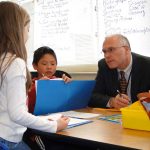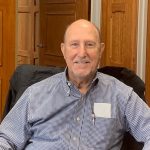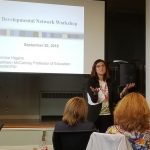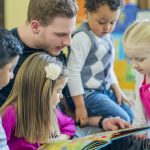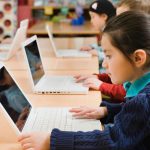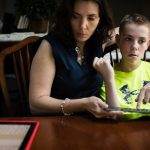Paul Freeman ’09 Ed.D. is in his 10thyear as the superintendent of Guilford (Conn.) Public Schools and has almost 30 years of administrative and teaching experience in schools in Connecticut. Freeman earned an Ed.D. in 2009 from the Neag School of Education. In addition to having recently been named the state’s Superintendent of the Year by the Connecticut Association of Public School Superintendents (CAPSS), he had been recognized in 2014 by the Neag School as Outstanding Superintendent of the Year.
If our nation’s cities and towns are going to be asked to do more and more, the pandemic partnerships and the progress we have made offer promise for a brighter future for our communities.
Lauren Dougher ’19 MA, a doctoral student in cognition, instruction, and learning technology; Jordane Virgo ’19 (CANHR), a master’s student in school counseling; and Elizabeth Canavan, a master’s student in the Integrated Bachelor’s/Master’s Program, have been named the recipients of the Neag School of Education Alumni Board Scholarship for 2021.
Having always practiced what he preached as a professor, advisor, and coach, William “Bill” Servedio is someone who walks the walk. Perhaps more accurately, the Neag School Professor Emeritus runs the run; he appears to have spent most every day of his 78 years moving at full tilt. And in recently establishing a scholarship fund for Neag School sport management students in addition to taking part in virtual discussions with alumni from the program, he clearly has no intention of slowing down.
The following is an excerpt from Chapter 1 of The Strategy Playbook for Educational Leaders: Principles and Processes (Routledge, 2021), a new book co-authored by Neag School Associate Professor Jennie Weiner and her colleague Isobel Stevenson, director at the Connecticut Center for School Change.
The volume is a how-to resource designed for superintendents, central office staff, principals, and teacher leaders that looks to “provide leaders with a concrete framework for a strategic improvement pan, helping educators link the ‘principles’ to ‘processes’ of planning.”
When 2020 began, we had no clue as to the changes coming to our children’s education. Looking to the new year, the only thing that seems certain is that uncertainty in school opportunity, format, and structure will continue as the conditions around us adjust. School will carry on as unpredictable and unprecedented.
Preschool can help ensure that children reach their fullest potential. Research suggests that preschool has a strong, positive impact on children’s brain development, relationships, and knowledge acquisition, as well as a broader return on investment for society. This brief summarizes this research and investigates preschool access in Connecticut.
We call them our colleagues, our peers, our mentors, or our coworkers – they are the people in our professional lives that also share in the details of our personal lives, who we associate with voluntarily, and who we trust with our thoughts, our experiences, and our fears.
Outside of work, we might call these relationships “friendships,” but it’s rarer to hear that particular f-word at the office – and the reason has to do with more than just semantics.
The University of Connecticut has been awarded a $179,000 grant from the U.S. Department of Education’s Office of Postsecondary Education for a new research project centered on reimagining dual language education. The project’s purpose is to improve the ability of dual language programs to promote the equitable bilingualism and biliteracy development of all students through a greater focus on sociocultural competence.
Children don’t come with how-to manuals. Even if they did, they would all require a manual of their own, tailored to their unique make and model. That’s why caregiving can be rewarding, as well as puzzling and demanding – particularly for family caregivers of children with disabilities. Although these caregivers often report that the role gives them a sense of purpose, it usually comes with physical, emotional and financial strains. COVID-19 has added major hurdles to accessing, delivering and evaluating special education services.
